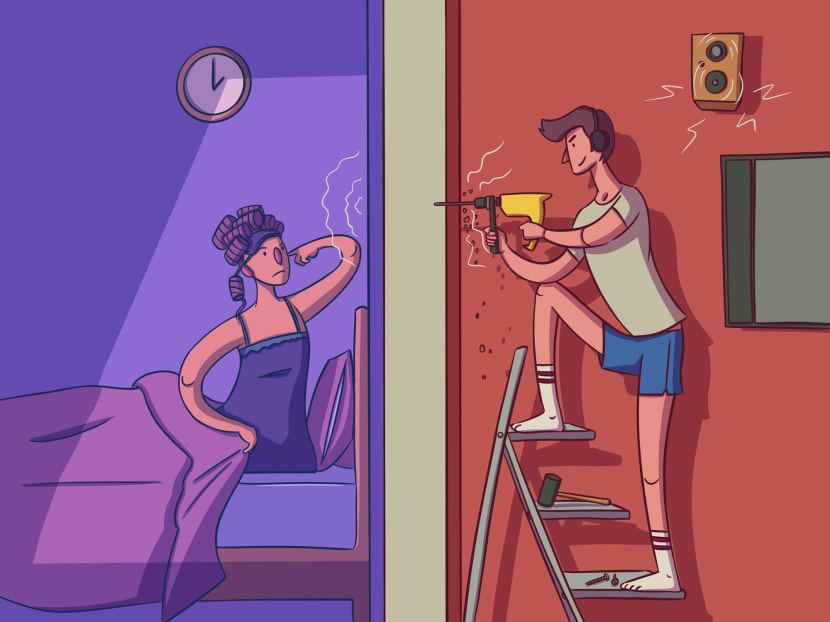Explainer: How badly behaved must one’s neighbour be to get an exclusion order?
SINGAPORE — The first exclusion order, which temporarily bars people from staying in their home, was issued here on Jan 6.
SINGAPORE — The first exclusion order, which temporarily bars people from staying in their home, was issued here on Jan 6.
This was after Mr Daniel See, a 29-year-old Bukit Panjang resident, had over the past two years endured hammering sounds from his neighbours, and made multiple trips to court to stop them from making the noises but to no avail, reported The Straits Times.
His neighbours, Madam Iwa and Mr Low Bok Siong, were barred by the Community Disputes Resolution Tribunal (CDRT) from their residence for one month.
But exactly how badly behaved must one’s neighbours be for the exclusion order to be issued?
In response to queries from TODAY, the Ministry of Law (MinLaw) said that exclusion orders are usually a last resort, and that 80 per cent of disputes between neighbours are resolved through voluntary mediation where residents settle the disputes by themselves, seek help from grassroots leaders or go to the Community Mediation Centre (CMC).
Most of the cases where disputes have been mediated are caused by noise nuisance, MinLaw added.
But even among the small proportion of neighbourly disputes taken to court, an exclusion order is usually not the first move on the cards, according to lawyers that TODAY spoke to.
‘SEVERAL STEPS’ BEFORE EXCLUSION ORDER CONSIDERED
Mr Terence Tan, associate director at Drew & Napier LLC, said that under the Community Disputes Resolution Act, there are several steps and orders before an exclusion order will be considered.
A claim has to first be brought to the CDRT, which is part of the State Courts, by a complainant against his or her neighbour.
“If the CDRT finds that the claim has been proved, then the tribunal can grant various orders including an injunction, which is an order that the neighbour stop doing certain things,” said Mr Tan.
According to the law, other orders that can be granted include an order for the neighbour to provide an apology and an order to pay for damages.
If the neighbour does not obey the orders, the CDRT can impose a special direction, where the complainant can ask the neighbour to comply with the orders within a specified time, said Mr Tan.
According to Mr Johannes Hadi, a lawyer at Eugene Thuraisingam LLP, should the neighbours fail to comply with the special direction without a reasonable excuse, it is an offence, which opens up two possibilities.
First, he or she may risk prosecution under the law, which carries a maximum of a S$5,000 fine or three-month imprisonment, or both. Second, he may be excluded from his residence under an exclusion order.
EXCLUSION ORDER A LAST RESORT
However, an exclusion order is not made lightly and acts as a last resort, said Mr Johannes, and that the CDRT must consider if it is “just and equitable” to impose this order.
“This is the first time an exclusion order has been made, so we do not yet have the benefit of case law to illuminate the ‘just and equitable’ standard in this context,” he said.
“But it appears that the tribunal would have to consider the potential impact of an exclusion order on the offender’s household and anyone else who may be affected.”
For Mr See’s case, the exclusion order was granted when the CDRT found that his neighbours breached the court order to stop creating a din. The lengths they would go to disturb Mr See also played a role in the decision.
For example, the trial heard that the family would cram into one master bedroom to sleep while wrapping their heads with towels and blankets just so they could play loud music in the bedroom directly below Mr See, The Straits Times reported.
Mr Tan added that there are no set thresholds for what constitutes “egregious or particularly bad behaviour” before the matter goes to court.
This is because a claim under the law is a private claim by someone against his neighbour, and it is up to the individual to choose whether there are grounds to make these claims.
“In this regard, different people will have different personal thresholds before they decide that they have to take some kind of formal legal action,” said Mr Tan.
WHAT IF THE NEIGHBOURS DO NOT COMPLY WITH THE EXCLUSION ORDER?
Mr See’s neighbours have said that they did not intend to comply with the exclusion order, with the couple’s son telling The Straits Times that the order was “unjust”.
For complainants whose neighbours do not comply with the exclusion order, they have two choices, said Mr Tan.
They can file a Magistrate’s Complaint to the State Courts, to start a private prosecution for breach of the exclusion order, where the magistrate can direct the police to start investigations against the neighbours.
If the court finds the neighbour guilty of the breach without reasonable excuse, he or she could be jailed for up to three months, fined a maximum of S$5,000, or both.
Alternatively, the complainant can bring contempt of court proceedings against the neighbour. Contempt of court is conduct that can impede the functionality of the court.
Should the neighbours be found guilty, they could be jailed for up to a year, fined up to S$20,000, or both.
However, bringing matters to court may not always be necessary. The neighbour could be non-compliant with the exclusion order, but have stopped behaving badly.
“The complainant then needs to consider if there is value in trying to prosecute his neighbour since the purpose of his claim was to get his neighbour to stop the offending conduct, and this might have been achieved,” said Mr Tan.












